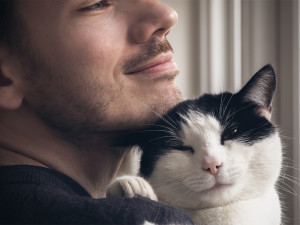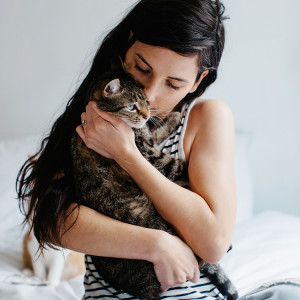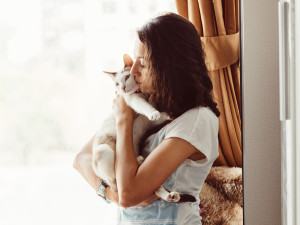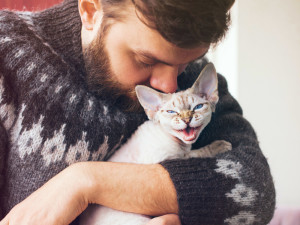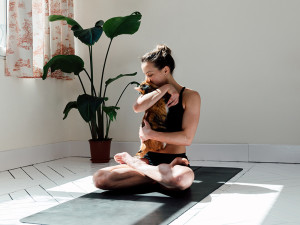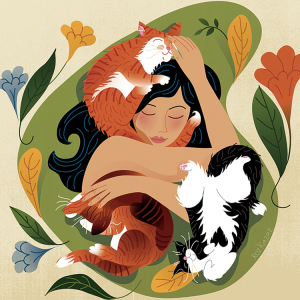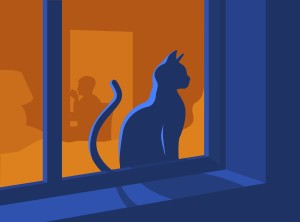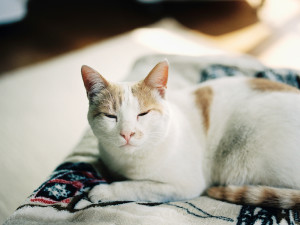Have a Big Ol’ Case of Anxiety? Studies Say a Cat Can Help
Believe it or not, that little ball of energy is actually your answer to stress relief.
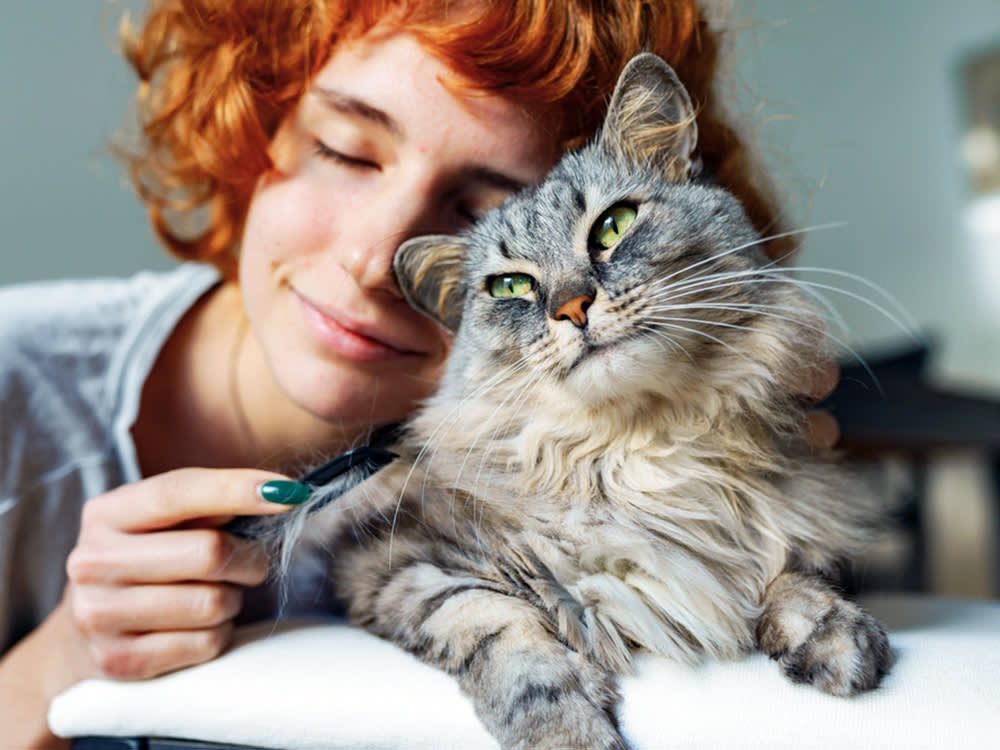
share article
Cat parents know that living with and loving their pets is kind of the best thing ever. You get snuggles, companionship, and a camera roll full of photosopens in a new tab of your pet adorably sleeping, sitting, or just existing. Honestly, what’s better than that?
Well, how about the fact that cat parenthood is actually good for you? Researchers have found that cats in particular may offer some potential mental health benefits to humans. While the science isn’t definite, a 2021 studyopens in a new tab found that pet parenthood in general may be linked to fewer symptoms of anxiety and depression. In other research, cat parents have been found to laugh more frequently and spontaneouslyopens in a new tab, were 36 percent less likelyopens in a new tab to report loneliness, and reported that their pet had a positive impactopens in a new tab on their mental health.
Let’s face it: You’re going to snuggle them anyway. And as you take care of them, they’re also taking care of you. We chatted with experts in the fields of animal research and human psychology to find out just how your cat can act as your own personal therapy animal.
The link between cats and mental health
If you’ve ever gotten to pet puppies or kittens during finals week in college or during a stressful work day, you’re probably well aware that a cute, fluffy face can cheer almost anyone up (even if you still had to take that stats final). In fact, a Washington State University studyopens in a new tab found that petting or cuddling with a cat for just 10 minutes relieved stress and improved students’ moods. It’s no wonder many colleges and universities turn to cats and kittens for much-needed stress relief for students dealing with hard tests. Cats can also work as therapy animalsopens in a new tab in hospitals and nursing homes because of their ability to bring delight and comfort to people.
“There is evidence from scientific studies that interactions with a companion animal, whether a pet or a therapy animal, can provide physical and mental health benefits to people,” Seana Dowling-Guyer, associate director at the Center for Shelter Dogs at Cummings School of Veterinary Medicine at Tufts University, says.
Dowling-Guyer notes, however, that the research isn’t yet conclusive, primarily because not enough studies have been completed on how cat parenthood affects mental health. “In all likelihood, there are probably benefits to pet ownership when a person wants to have a pet and has a good relationship with their pet because of the regular, positive interactions and companionship,” she says.
Cuddles and companionship
Snuggling your cat can make them happy (hence the purringopens in a new tab), but cuddling a kitty can help reduce the levels of cortisol, aka the stress hormone, in your body. Some studiesopens in a new tab suggest that just spending time with your cat can even lower your heart rate and blood pressure. Cat parenthood may even help some people manage long-term mental health conditionsopens in a new tab.
Dr. Gregory Kushnickopens in a new tab, a psychologist in New York City, notes that simply having a pet in the home “lowers your heart rate, combats loneliness, and increases mind and bodily experiences associated with attachment bonding.”
The power of purring
A cat’s purrs can be cute, but they can also be healing. The frequency of their purring falls between 25 and 150 Hertzopens in a new tab — the same range as vibrational and electrical frequencies that are used in clinical settings to treat pain and injuries. Many experts believe that cats purr as a self-soothing mechanism, and they may be able to pass that calming effect on to you.
That’s right: Your cat’s purrs could help reduce your stress and lower your blood pressure. So, settle in for some snuggles, and enjoy the benefits of their sweet purring, even if it sounds like a lawn mower is running inside your house.
Finding purpose in caring for your kitty
A cat can help reduce feelings of loneliness while also providing the stability of a routine. Having someone else to take care of can give your life a sense of focus and meaning, even in the smallest ways. A 2017 studyopens in a new tab found that cat parents reported lower feelings of depression, and 44 percent opens in a new tabof them felt their cats gave them “a sense of safety.”
“Cats offer a lower-maintenance version of companionship,” Dr. Kushnick says. “They are often self-sufficient enough that you don’t have to accommodate your schedule to meet their needs.”
Still, just like dogsopens in a new tab, cats can offer support that can be beneficial to those suffering from anxiety symptoms. “Cats lower our anxiety by making us feel loved, giving us a sense of calm and closeness, and allowing us to self-soothe through petting, sharing moments together, and listening to them purr,” Dr. Kushnick adds. “They make us feel less alone.”
In a study where researchers interviewed cat parentsopens in a new tab, they found that most activities people did with their cats increased feelings of enjoyment and provided feelings of purpose. Caring for a cat helped people lower levels of stress, better manage their emotions, and even increased their ability to handle difficult life circumstances.
Cats are often seen as aloof or distant, especially compared to their canine counterparts, but they get a bad rap in that department. They can actually be pretty wild for affection and be your 24/7 purr-and-cuddle machine. Whether playing, cuddling, or cleaning out the litter boxopens in a new tab (OK, maybe not that last one), just remember: a cat a day (or just the same cat every day) keeps the doctor away. You know, unless you’re allergicopens in a new tab — then you’ll need that doctor’s allergy shots.
References:
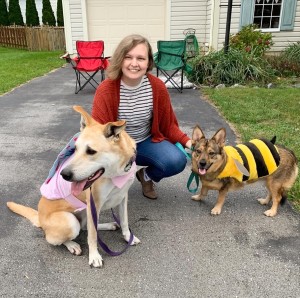
Savannah Admire
Savannah Admire is a writer, poet, and pet mom to three dogs and a cat. She currently lives in Western Maryland. When she’s not writing, you can find her reading, taking photos, or volunteering as a content creator for her local community theatre. Her debut poetry book, Mother Viper, is due out August 12, 2025, and you can follow her on Instagram at @savannahcooperpoetopens in a new tab.
Related articles
![Valentin Pujadas illustration]() opens in a new tab
opens in a new tabFYI, Pets Are Incredibly Good For Your Mental Health
This Mental Health Awareness Month, experts share the science-backed ways our pets offer us emotional support.
![A woman holding a cat close to her while sitting on a yoga mat.]() opens in a new tab
opens in a new tabShockingly, Your Pet Will Enhance Your Mindfulness Practice
The next time they try to kiss your face while you’re in corpse pose, let them.
![A woman with black hair surrounded by cats cuddling her]() opens in a new tab
opens in a new tab6 Science-Backed Ways Being a Pet Parent Improves Your Health
They say laughter is the best medicine, but so is a pet (especially one who makes you laugh).
![dark-haired woman hugging cat that has imprinted on her]() opens in a new tab
opens in a new tab10 Signs Your Cat Has Imprinted on You
Feeling like you have a little shadow these days? Here’s why that’s happening.
![]() opens in a new tab
opens in a new tabThis Study Says You Literally Can’t Hide From Your Cat
Happy spooky season.
![White and light brown cat laying down with eyes almost closed]() opens in a new tab
opens in a new tabStudy Says “Slow Blinking” at Your Cat Helps You Bond
A team of psychologists at the Universities of Sussex and Portsmouth have discovered the key to building a bond with cats.
